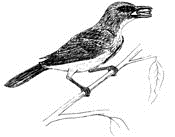Vertebrate Pest Conference: Proceedings

Vertebrate Pest Conference Proceedings: 17th (1996)
Date of this Version
1996
Document Type
Article
Citation
Published in Proceedings: Seventeenth Vertebrate Pest Conference … 1996, ed. Robert M. Timm & A. Charles Crabb (University of California, Davis, 1996).
Abstract
Social and political pressures affect decision making regarding wildlife damage management issues tremendously. In fact, these areas are included in the Animal Damage Control decision model outlined in the programmatic Environmental Impact Statement. Growing concern regarding pain and suffering of animals trapped by ADC Specialists prompted two actions by the 41st Legislature of the State of New Mexico in 1994. The legislature directed New Mexico ADC not to spend over three-quarters of its $304,000 appropriation on lethal methods. The legislature also passed a memorial bill requesting the New Mexico Department of Game and Fish, in cooperation with the U.S. Fish and Wildlife Service, and Animal Damage Control, to prepare a report with recommendations on non-injurious methods for controlling wildlife damage to private property. In response, the report was prepared and ADC employees in New Mexico conducted a survey of cooperators to determine what non-lethal methods they had implemented. Over 1,300 active agreements were surveyed to determine what non-lethal methods had been tried, what it cost to implement those methods, which methods were successful, why some methods were discontinued, and whether lethal methods were also used to reduce agricultural and other property losses. Survey results, the report on non-injurious methods, and a fiscal account of state appropriations spent on non-lethal methods was provided to New Mexico legislators during the 1995 session.
Included in
Animal Sciences Commons, Bioresource and Agricultural Engineering Commons, Environmental Engineering Commons


Comments
Copyright © 1996 (where applicable) by the Vertebrate Pest Council of the Vertebrate Pest Conference. Used by permission.